16th of October 2021:
24 hour global virtual event
26th – 29th of October 2021:
7th ALGOA/ GOAD Summit
Online and on-site in Goesan County, South Korea
8th of September 2021:
Organic World Congress – OFSP Workshop 8th of September, 15:30-17:00 CEST
6 – 10 September 2021:
20th Organic World Congress 2021
Online and on-site in Rennes, France
14th February 2021:
Virtual BIOFACH: OFSP workshop and partner meeting hosted by FQH
12.00-14.00h – more infomation
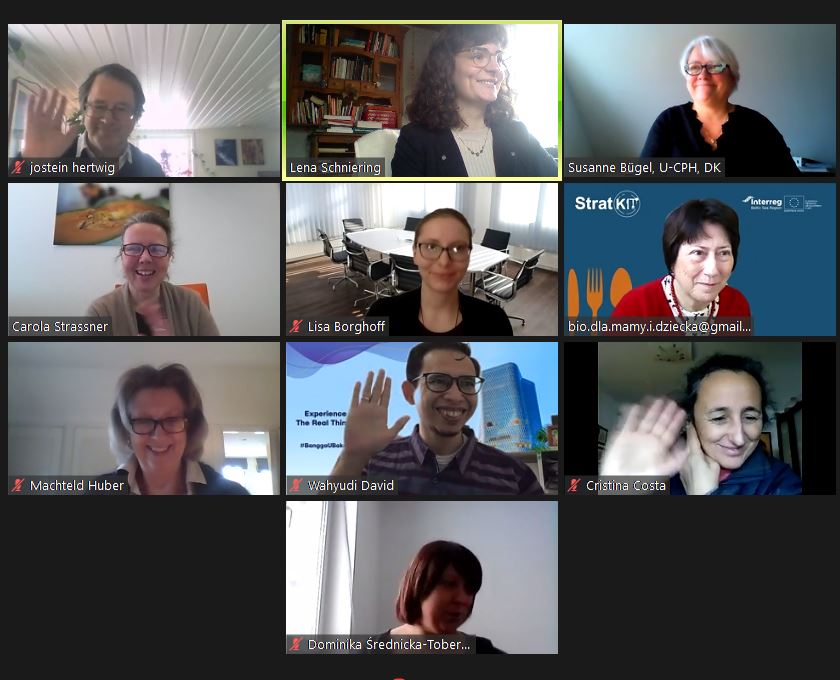
6th ALGOA Summit: 12th – 16th October 2020:
Monday – Friday: 7:00 – 13:00 h, via Zoom hosted in Goesan County, South Korea
Click here for closer information
Biofach: Thursday, 13th February:
12:00-12:45 h, Room Athen
FQH meeting, General assembly
Biofach: Thursday, 13th February:
13:00-14:45 h, Room Athen
OFSP meeting
Biofach: Thursday, 13th February:
14:00-15:45 h, Room Kiew
ProOrg Public Session
Biofach: Wednesday, 12th February:
17:00-18:00 h, Room Prague
Workshop on sustainable diets/ organic food systems
12– 13th February 2020, Nuremberg, Germany:
8th OFSP meeting at Biofach – for more information
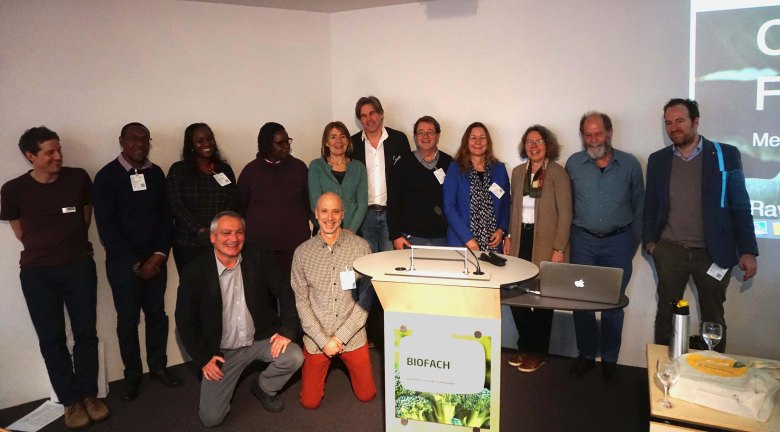
6th February 2020:
OFSP members at meeting between Asian Local Governments for Organic Agriculture (ALGOA) and the International Network of Eco-Regions
(IN.N.E.R.) in Rome/ Italy
18-20th September 2019, Goesan/ Korea:
OFSP Workshop
12-13th September 2019, Warsaw/ Poland:
OFSP Workshop
15-17th May 2019, Palermo/ Italy:
2nd World Conference on Revitalization of the Mediterranean Diet
14th February 2019, Nuremberg/ Germany
14-17th November 2018, Logroño/ Spain
XIII Congreso de Agricultura Ecológica: “Sistemas alimentarios agroecológicos y cambio climático”
5-8th November 2018, Yaoundé/ Cameroon
4th African Organic Conference
6 and 7 November 2018, Paris/ France
European Club “ Organic Food Territories
30 October 2018, Provence/ France
Forum for agriculture and food
3rd-6th July 2018, Stuttgart-Hohenheim/ Germany
29th March 2018, Paris/France
International Seminar of the Agence BIO
15th February 2018, Nuremberg/ Germany
8th November 2017, New Delhi/ India
Food Systems 3.0: Pre-Confrence, Organic World Congress
20th October 2017, São Paulo/ Brazil
OFSP Workshop in collaboration with the University of São Paulo
19th October 2017, Buenos Aires/ Argentina
OFSP symposium at International Congress of Nutrition
5-7th September 2017, Tallinn/ Estonia
OFSP representation at 11th European Organic Congress
24-29th July 2017, Denpasar, Bali/ Indonesia
OFSP representation at Bali Summer Course II
12-13th July 2017, Rome/ Italy
OFSP representation at FAO technical workshop on SUSTAINABLE DIETS IN THE CONTEXT OF SUSTAINABLE FOOD SYSTEMS
21-23th June 2017, Pretoria/ SA
OFSP representation at 1st Global Conference of the 10YFP Sustainable Food Systems Programme
22-23th May 2017, Sichuan/ China
OFSP representation at 2nd IFOAM Asia conference on “Innovations on Organic 3.0.”
14-15th March 2017, Valenzano (Bari)/ Italy
OFSP representation at technical workshop: Development of voluntary guidelines for the sustainability of the mediterranean diet in the mediterranean region.
OFSP Partner Flavio Paoletti presented the OFSP as an example for 10YFP-SFSP.
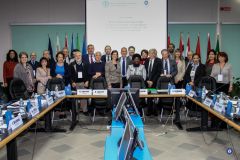
OFSP workshop at WITA
7th-10th March 2017, Freising-Weihenstephan/ Germany
OFSP partners presented and discussed several topics under the issue of a systems approach in the field of organic farming at 14th scientific conference of organic agriculture. Participants of the workshop discussed thoughts and ideas by applying a world café method. Besides we take the chance to launch the OFSP in the german language usage.
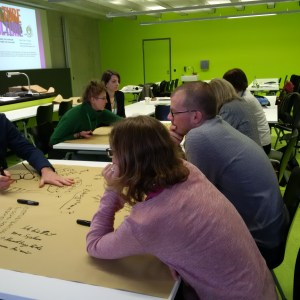
OFSP/ FQH workshop at Biofach
16th February 2017, Nuremberg/ Germany
With moderation of Prof. Ewa Rembialkowska, experts from the OFSP presented and discussed several topics “Towards a sustainable organic food system. Transformation processes from organic agriculture to sustainable lifestyles”. Prof. Johannes Kahl from University of Copenhagen/Denmark introduced organic food systems as models for sustainable food systems and linked organic food as part of dietary concepts taking the New Nordic Diet as example. Prof. Carola Strassner, from MUAS/Germany focused on the role of organic food in public services as one of the important entry points to sustainable organic food systems. In Germany and some other EU countries organic food is a growing part of public procurement, especially in the school canteens. Jostein Hertwig, Beras Int./Norway reported from a case study of organic food systems, local food societies and learning centres with the Swedish municipality Södertalje as example. Dr. Katrin Zander, Thünen-Institut/Germany gave an overview on the role of consumers in organic food systems as a major element to take into account, when transforming food systems towards enhanced sustainability. She underlined the importance of the coherent food chains, connecting the environmentally aware consumers with the organic/sustainable producers and traders. Susanne Braun, University of Hohenheim/Germany brought organic together with regional and traditional foods as complementing or part of the organic sector.
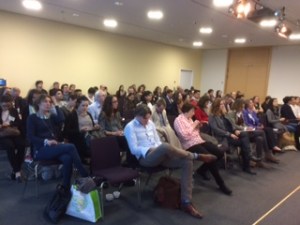
National Congress of the Italian Society of Human Nutrition
30th November – 2nd December 2016, Bologna/ Italy
As a part of the XXXVII National Congress of the Italian Society of Human Nutrition (SINU), a symposium was organized focused on the environmental impact and sustainability of different dietary patterns. OFSP partner Flavio Paoletti has been invited to present the development of the Organic Food System and its role in supporting the sustainability of diets.
OFSP in Africa
24th-26th November 2016, Addis Ababa/ Ethiopia
OFSP partner Prof. Victor Olowe from Nigeria presented OFSP during the conference “Changing Food Systems in Africa: Agro-ecology, Food Sovereignty and their Roles in Nutrition and Health”. About 120 participants attended the Conference from 21 countries. OFSP projects in Africa have been discussed. Here the programme.
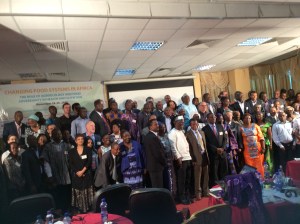
Celebrating food
24th-26th October 2016, Novi Sad/ Serbia
OFSP partners from Denmark, Poland, Serbia and Slovenija met during a food conference in Serbia.

IFOAM Asia Organic Congress
29th September to 1st October 2016, Goesan/ Korea
The first IFOAM Asia conference in Korea brought together people from several Asian countries to manifest Organic 3.0 in Asia. OFSP partners actively took part and presented the organic food system initiative, discussed further developments towards sustainable organic food systems including healthy diets and exchanged ideas how to set to practise under different conditions. New partners joined OFSP strengthening the Asian perspectives in the program.
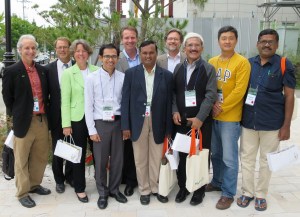
OFSP partners from China, Denmark, Germany, India, Indonesia, Norway and USA during a break in Goesan/Korea (by the way: we heavily work on the gender perspective!)
Congress on World Nutrition
30th August to 2nd September 2016, Cape Town/ South Africa
OFSP partners organised a workshop on “Linking healthy consumption patterns and sustainable production: Can we take the organic food system as a model for sustainable food systems?” One emerging topic was the contribution of the organic food system to public health issues. Johannes Kahl presented the overall strategic roadmap of OFSP key activities and Carola Strassner focused on the role of organic in public procurement. Carlos Monteiro from USP in Brazil linked public health effects of ultra-processed food and Wahyudi David from Bakrie/Indonesia showed how food system view contributes to setting organic standards in Indonesia.
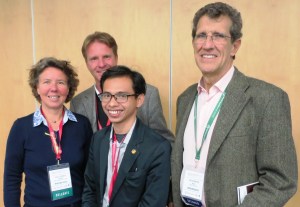
Carola Strassner, Johannes Kahl, Wahyudi David and Carlos Monteiro during the workshop in Cape Town 2016
Workshop on Sustainable Value Chains for Sustainable Food Systems, FAO-UNEP Sustainable Food Systems Programme
8th-9th July 2016, Rome/ Italy
OFSP partners contributed to the workshop with focus on the OFSP as a global network of actors along sustainable food value chains (Johannes Kahl), the New Nordic Diet as a regional sustainable diet (Susanne Bügel) as well as organic in public procurement (Carola Strassner). Furthermore Flavio Paoletti and Jostein Hertwig took part in the different sessions. All together is was a very fruitful meeting, where ideas have been exchanged between representatives from different approaches. New contacts and various possibilities for further collaborations could be generated by intensive talks and discussions. Here the link. Proceedings will come later this year.
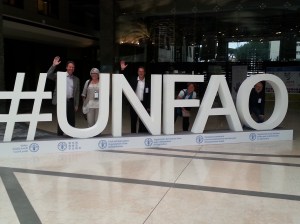
OFSP expert workshop on “Modelling and assessing sustainable diets – approaches and research challenges”
19th April 2016, Copenhagen/ Denmark
The workshop was part of the Organic Food System Programme (OFSP). A sustainable food system comprises both agriculture and health, but may also include eating patterns. It has been suggested that dietary habits or patterns should be assessed in at least two different dimensions: impacts on health (nutrition) and impact on environment. Thereby, in order to develop, define and verify healthy and sustainable diets, a holistic approach is proposed. In order to model and assess the impact of diets on sustainability of food systems and human health, models, methods and parameter are needed.
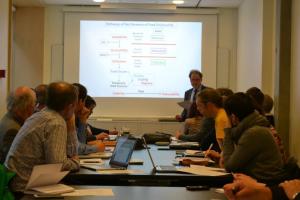
Elliot Berry from Hebrew University, Israel took us from pillars to pathways of sustainability taking the timely development into account!
As modelling and assessing of diets on sustainability and health is a relatively new field of research, different existing approaches need to be compared and verified to what degree they can support the different research focuses and questions. Therefore the goal of the workshop was to exchange knowledge on different approaches and identify challenges and gaps modelling and assessing the impact of diets on sustainability and health. There have been three starting questions:
- Which tools (models, methods for evaluation) support optimization of dietary recommendations towards sustainability, when all 4 pathways of sustainability are taken into account?
- How to model and assess multidimensional criteria such as biodiversity?
- How do models and tools for evaluation help to link sustainable consumption to sustainable production?
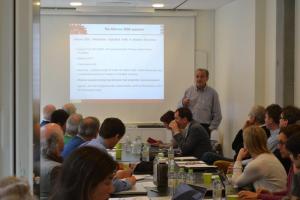
Philippe Pointereau from Solagro, France presented future scenarios, if we would turn diets to be more sustainable!
30 internationl experts from 14 different countries and different disciplines discussed these questions in a highly inspiring atmosphere. Here the programme. The findings from this workshop will be summarized in a scientific paper within the next few months. Information on this will come later.
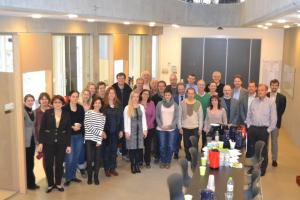
Successful launch of OFSP
10th February 2016, Nuremberg/ Germany
The comprehensive international Organic Food System Programme (OFSP) has being launched at the world’s leading trade fair for organic food, the BioFach in Nuremberg. Several highly recognized experts from all over the world presented aspects of the OFSP.
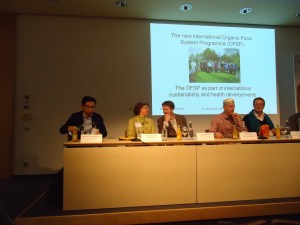
The OFSP makes the link between healthy production and healthy eating. It takes a novel approach by using the organic food system as a working example for sustainable food systems. Johannes Kahl, one of the three programme coordinators: “From a scientific point of view, the organic food system offers a global food system for analysis, including key elements such as metrics, principles, various practises and lots of data for modelling and testing. By taking it as a model with a clear link between production and consumption, we will be able to pursue answers to various questions dealing with the problems in our food system and diets today.” Prof. Dr. Carola Strassner from Münster University of Applied Sciences, Germany presented the key questions for scientific challenges within OFSP projects and Prof. emeritus Dr. Denis Lairon (NORT laboratory/University, Marseille, France) showed how organic consumption patterns seems to be near to sustainable and healthy food choices.
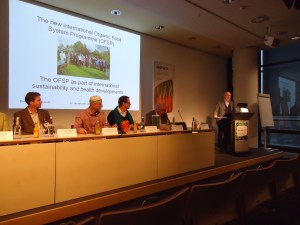
There are various studies showing a contribution of organic agriculture to global sustainability aspects. Major issues for shifting food systems towards sustainability revolve around how to change consumption patterns and how to improve the nutritional quality and related health characteristics of food. While the organic food market is growing rapidly worldwide, the dietary pattern of organic consumers seems to be closer to healthy dietary patterns as well as to the FAO’s sustainable diet concept. Jostein Hertwig, member of the steering committee and coordinator of BERAS in Sweden: “The real potential of the Organic Food System Programme flows from the close interrelations and processes between scientists, actors in the food chain, NGOs and authorities, in working together for practical implementation at local levels. Starting with the dedicated networks of Food Quality and Health, IFOAM – Organics International, and BERAS, this in an invitation for others also to join.”
David Gould, Program Facilitator at IFOAM – Organics International: “We need to change the thinking from food chain to food system. More people need to be aware of the connection between farming and eating, and together with more institutions play an active role in bringing healthy food to the table. They should be enabled to make informed choices and incentivize better practices.” Prof. Dr. Wahyudi David (University of Bakrie, Indonesia) presented Indonesia as a model region within the OFSP. The Organic Food System Programme consists of many different projects being run at sites around the world and enjoys a wide range of disciplinary perspectives.
OFSP at Biofach Science day
12th February 2016, Nuremberg/ Germany
The OFSP has been presented during Science Day at Biofach in Nuremberg on February 12th. In presence of Andre Leu, President IFOAM – Organics International and Hans-Jörg Lutzeyer, Unit Agri-Food Chain, Directorate-General for Research and Innovation, European Commission and others, Johannes Kahl gave the key note speech on the potential contribution of organic food systems to sustainable and healthy diets.